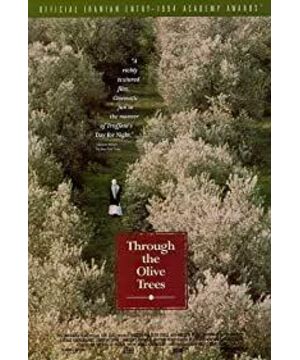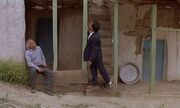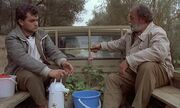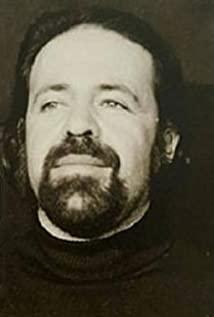There was always wind, such a strong wind.
At the beginning of the film, in a vacant lot surrounded by sparsely grown trees, the director of the play within the play, his assistant, and the group of girls. The trees swayed violently in the wind, and the director's gray hair fluttered in the wind, as did the headscarves of his assistants and the girls. Everything in the horizon seems to be gray, including the sky, including the trees, including the wind (if the wind has color too). The girls' clothes were also dark. But they almost without exception have big bright eyes. Their young voices are also so nice. At first I felt so cold. It seemed that it was not so cold in the film, but the immersive feeling that I was in such an empty and cold place. But the bright eyes and young voices of the girls made me feel some warmth and energy.
And in the cemetery. The male protagonist Hussein went to the cemetery again and again, just to meet his favorite girl Hetali there. There seems to be more wind there. Small flags of various shapes and meanings that I do not understand are flying in the wind and making noises. The same gray sky, including the wind. High and low, or rapid or long crying and cries one after another. Although the language is different, the sadness in the cry is the same. That kind of unbearable pain. This is the surviving people in the village mourning their lost loved ones after the tragic earthquake. Hartari lost her parents in the earthquake and now lives with her grandmother.
The earthquake changed everything. Destroyed, broken walls, pitted dirt roads, and desolate mountains.
In the film, I only see two houses that can barely live in. One is that the heroine Hetali lives with her grandmother, and it feels like it's crumbling. The film once said through Hussein's words that after the earthquake, everyone is equal, and no one has a house anymore. So, I don't know what kind of house Hartali and grandma are living in now. There is another place, the filming scene of the play within the play, the broken and damaged second floor, but at least people can go up and down the stairs without feeling dangerous. Hussain took the opportunity of filming to constantly confess to Hertalie. He said that he would work hard to buy the house. He also said he would open a window so that Taherili would wake up every morning and see the mountains when he opened his eyes.
The house has always been a pain in Hussein's heart. He has not studied, and since the age of 11, he has been working in other people's homes as a stonemason. He has no house. Before the earthquake, he pursued Khatari. He felt that she had read books, she was so elegant, and she was the woman he wanted to marry. But Hetali, who was from a good family, made him out of reach, and her parents did not give him a glimmer of hope. Today, he still stubbornly pursues her, and now it is her grandmother stubbornly rejecting him, the reason is still that he has no education and no house. And Hetali herself, apart from the lines in the play, never said a word to him. Her mind was buried very deep.
The earthquake seems to have changed everything. What you can see, what you can't see, inside and outside, there are thousands of holes. However, the earthquake did not change everything after all. Such as Hussein's dedication to love. For example, Hertalie's grandmother insisted on her own way to ensure her granddaughter's future happiness. For example, the group of women in the film who refuse to leave their homeland firmly love their quiet home with vegetable gardens, trees, rice fields and even flies, and refuse to move to live by the road. Such as the girls spring-like bright eyes and white teeth. Such as Hartari's love of beauty. For example, the people in the film love flowers.
Yes, flowers, they keep appearing in the film. Although the house where Hetali and her grandmother lived looked like a dilapidated house, there were so many flower pots in front of the house. At the filming scene of the play-in-play, the balcony of the dilapidated building was also full of flowers. Some of those flowers were brought by the actors (all locals), and some were lent to the crew by the village children from their homes. It seems a little unimaginable. Not long after the earthquake, most people still have no fixed place to live and can only live in tents. Where do so many flowers come from? It's as if people have been living and working in peace and contentment. There are also many shots of watering flowers in the film, and those flowers have been taken care of by people. I think what they take care of is actually hope for the future. In the difficult life of post-disaster reconstruction, these flowers, these beauties, can undoubtedly bring more comfort to the hurt heart and more vitality.
What impresses me the most is Hussein's frankness and bravery. In fact, he has also retreated, because he has never been able to get a response from Hetali, because he has been beaten "no house, no culture". But later, the film crew was obviously inspired and inspired by that particularly loving director. The later in the film, the more confident and brave he becomes. And he said such interesting things, which opened my eyes.
On the set, he took every opportunity to confess to Hertalie. In the play, he asked Hertalie, who played his wife, to find socks for him. Then he said to Hartalie between filming: "I have enough tact to put my socks, my clothes, everything I have." He also described to her what kind of life he would give him after marriage.
He walks through olive groves twice in the film. The first time was to follow Hartali's grandmother and ask her to promise to marry her granddaughter to him. He admits that he has no house and no education, but he said: "It's important to be polite, smart, and understanding people." Faced with his grandmother's stubbornness, he said, "Are you sure your granddaughter thinks the same way?"
The second time, and at the end of the film, he follows Hartari. Along the way, Hertalie walked forward unhurriedly and silently. And Hussein babbled like a one-man show—
"I want to live with you, God is my witness, not for your beauty, not for anything else."
"I work, and slowly I will have a house, and I will be no worse than the others."
"We can live together and people will envy us."
"If you don't agree, give a reaction, and I won't bother you again."
The same section of the road, which was dark before, became bright the second time. The green of the leaves and grass had obvious layers, there was sunshine, and there were flowers, and the wind stopped. The sadness that had pervaded before seemed to fade and disappear now. I think that was probably changed by Hussein's enthusiasm and persistence.
Later, on the winding road that went uphill and then downhill, after a pause, Hussein began to chase after Khatari, who was far away, and then ran back eagerly after catching up. The colors of the trees in that field became brighter, and even in the distance there seemed to be a vague appearance of a village, and the flowers on the roadside were clumps after another. Suddenly, I felt that the years were quiet, at least I saw that kind of prospect. The background music is also cheerful.
I don't know if Hussein got a reply from Hatali, or what kind of ending he got. But it doesn't seem to matter anymore. If your dreams come true, let's fight for the future together. If you are rejected, you will have no regrets. Like Hussein's line in the script: "As long as we live, we will continue to live."
In fact, all those stubborn, those stubborn, those kind, those pains, those hardships, those longings, those flowers, those trees, those grasses. (There are even flower-like Iranian characters that appear at the beginning and end of the credits.) All of this is a reason to continue living, and it is also a strength.
It should be noted that this film is the representative work of Iranian director Abbas. When Abbas died of cancer in July 2016, the media reported that "the world's cinema has lost a guiding light", and his ongoing production of "Hangzhou Love" has finally become an unfinished posthumous work.
View more about Through the Olive Trees reviews








